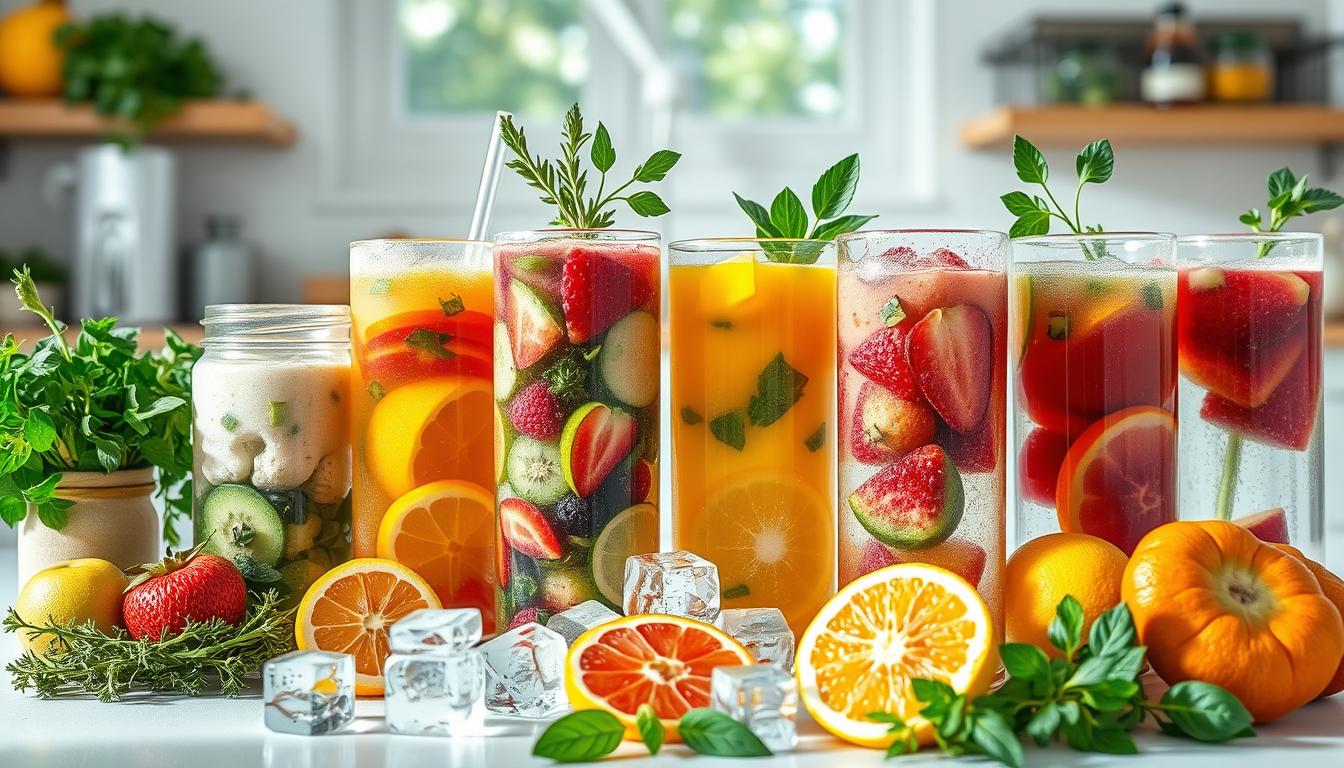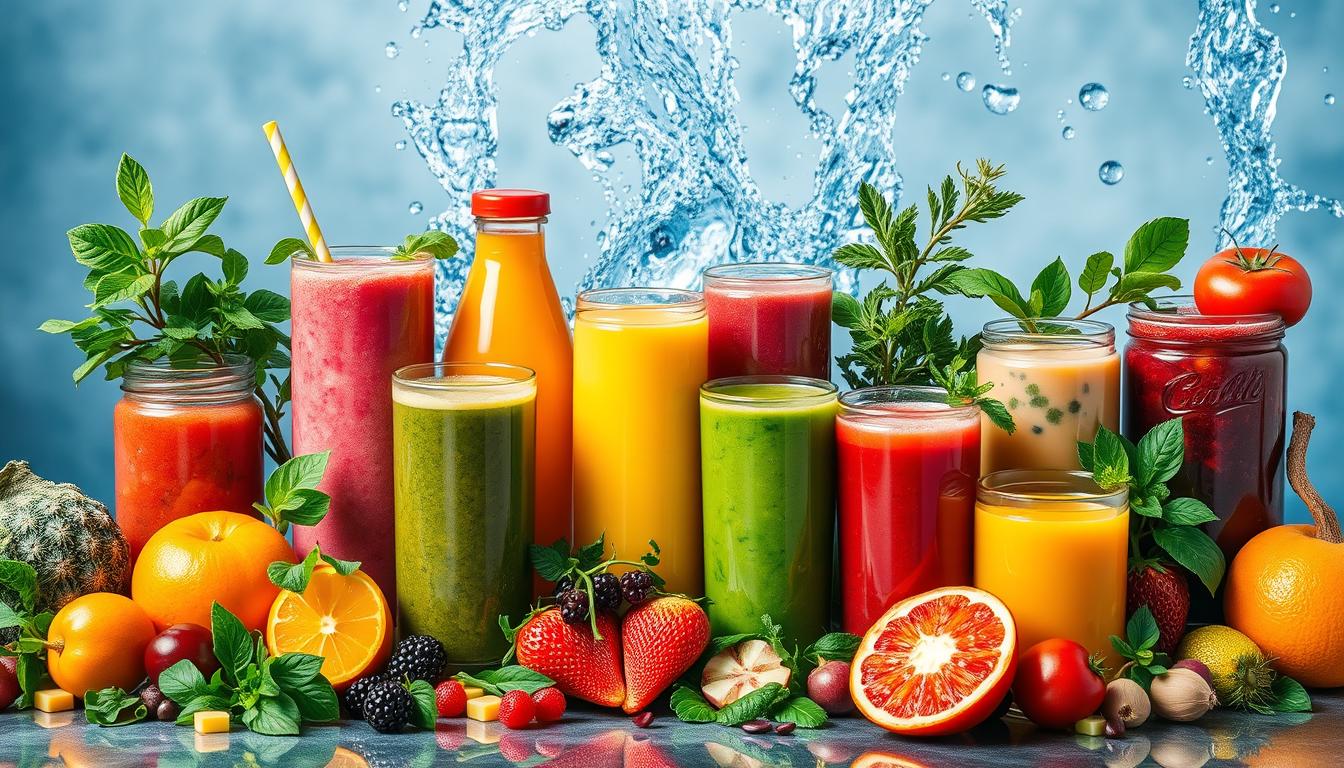Greetings! Are you tired of feeling bloated and uncomfortable? Look no further – we have the solution for you. Introducing the water diet, a simple and natural way to reduce bloating and improve your overall well-being.
Bloating can be caused by various factors, such as excess gas in the gastrointestinal region or fluid retention. By incorporating more water into your daily routine, you can flush out excess sodium, improve digestion, and reduce bloating. It’s a natural and easy-to-follow regimen for a lighter, healthier you.
Key Takeaways:
- Stay well hydrated to prevent fluid retention and constipation, both of which contribute to bloating.
- Incorporate potassium-rich foods, like bananas and watermelon, to flush out belly-bloating sodium.
- Engage in regular physical activity, such as walking, to stimulate the digestive system and alleviate bloating.
- Add probiotics to your diet through supplements or fermented foods to improve digestion and reduce bloating.
- Practice mindful eating by chewing food slowly and paying attention to hunger and fullness cues to prevent overeating and swallowing excess air.
What Causes Bloating
Bloating can be caused by several factors that lead to excess gas in the gastrointestinal region. It’s important to understand these causes in order to effectively address and reduce bloating. Some common causes of bloating include:
- An imbalance of bacteria in the gut
- Eating too much fiber
- Eating too fast
- Swallowing too much air
- Drinking from straws
- Consuming certain gas-producing foods, such as beans and lentils
To prevent excessive bloating, it’s crucial to pay attention to your eating habits and make necessary adjustments. Avoid gum chewing, eating too quickly, and drinking from straws, as these can contribute to bloating. Additionally, be mindful of your consumption of gas-producing foods and consider alternative options if they cause discomfort.
Foods that Contribute to Bloating
Some foods have a higher likelihood of causing bloating due to their gas-producing properties. Here are a few examples:
| Gas-Producing Foods | Alternative Options |
|---|---|
| Beans and lentils | Quinoa and lean meats |
| Cruciferous vegetables (broccoli, cauliflower, cabbage) | Zucchini and spinach |
| Carbonated drinks | Herbal tea or infused water |
By being mindful of your food choices and opting for alternatives that are less likely to cause bloating, you can significantly reduce discomfort and achieve a healthier digestive system.
Tips to Reduce Bloating
When it comes to reducing bloating, there are several helpful tips that can make a significant difference in your digestive comfort. By incorporating these strategies into your daily routine, you can minimize stomach distension and begin to experience a lighter, more comfortable feeling.
1. Stay Active and Stretch Your Abdomen
Engaging in regular physical activity is not only beneficial for overall health but also for reducing bloating. Exercise helps stimulate the digestive system, aiding in the movement of trapped gas and promoting regular bowel movements. Incorporate abdominal stretching exercises into your routine to specifically target the muscles in your abdomen and improve digestion.
2. Consume Potassium-Rich Foods
Potassium is an essential mineral that plays a vital role in maintaining fluid balance in the body. By including potassium-rich foods in your diet, such as bananas and watermelon, you can help flush out excess sodium and reduce bloating. These foods act as natural diuretics, increasing urine production and decreasing fluid retention.
3. Hydrate, Hydrate, Hydrate
Proper hydration is crucial for reducing bloating. When your body is dehydrated, it tends to hold onto fluids, leading to bloating and water retention. Aim to drink at least eight glasses of water per day to maintain optimal hydration levels. This will help prevent constipation and promote regular bowel movements, keeping bloating at bay.
| Recommended Potassium-Rich Foods |
|---|
| Bananas |
| Watermelon |
| Avocados |
| Sweet Potatoes |
Avoiding known bloating triggers, such as carbonated beverages, chewing gum, and drinking through a straw, can also help reduce stomach distension. By implementing these simple tips, you can take control of bloating and enjoy a more comfortable digestive experience.
Potassium-Rich Foods for Bloating Reduction
When it comes to reducing bloating, incorporating potassium-rich foods into your diet can be highly beneficial. Potassium helps regulate fluid balance in the body, preventing fluid retention and reducing bloating. By including these foods in your meals and snacks, you can enhance your efforts to achieve a bloating-free lifestyle.
Table: Potassium-Rich Foods for Bloating Reduction
| Foods | Potassium Content (per serving) |
|---|---|
| Bananas | 400mg |
| Avocados | 970mg |
| Sweet Potatoes | 540mg |
| Spinach | 540mg |
| Oranges | 240mg |
These are just a few examples of potassium-rich foods that can aid in bloating reduction. By including a variety of these foods in your diet, you can ensure you are getting an adequate amount of potassium to support healthy fluid balance and minimize bloating.
Remember to consult with your healthcare provider or a registered dietitian before making any significant changes to your diet, especially if you have any underlying health conditions or are taking medication.
Other Diuretic Foods for Bloating Reduction
When it comes to reducing bloating, incorporating diuretic foods into your diet can be beneficial. These foods promote the excretion of excess fluids from the body, helping to alleviate bloating and reduce water retention. In addition to potassium-rich foods, there are several other diuretic options that can aid in bloating reduction.
One such option is asparagus. This nutritious vegetable contains compounds that act as a natural diuretic, stimulating urine production and flushing out unwanted fluids. Including asparagus in your meals can help reduce bloating and promote a lighter, more comfortable feeling.
Cucumbers are another diuretic food that can assist in bloating reduction. With their high water content and natural diuretic properties, cucumbers can help eliminate excess sodium and flush out toxins, reducing bloating and promoting a healthy digestive system.
| Foods | Bloating Reduction Benefit |
|---|---|
| Asparagus | Acts as a natural diuretic, stimulates urine production |
| Cucumbers | High water content, natural diuretic properties |
| Fennel | Helps promote digestion and reduce water retention |
| Celery | Contains compounds that act as a natural diuretic |
| Berries | High water content, promote healthy digestion |
| Watermelon | High water content, promotes urine production |
Fennel, celery, berries, and watermelon are also diuretic foods that can be included in your bloating-reducing diet. Fennel helps promote digestion and reduce water retention, while celery contains compounds that act as a natural diuretic. Berries, with their high water content, not only provide essential nutrients but also aid in healthy digestion. Similarly, watermelon, with its high water content, promotes urine production and helps eliminate excess fluids from the body.
By incorporating these diuretic foods into your diet, you can actively reduce bloating and achieve a lighter, more comfortable feeling. Remember to include a variety of these foods in your meals and enjoy the benefits of a bloating-free lifestyle.
Benefits of Physical Activity to Reduce Bloating
- Stimulates digestion: Physical activity stimulates the muscles in our digestive system, promoting better digestion and reducing bloating.
- Relieves trapped gas: Moving our bodies helps pass trapped gas, providing relief from bloating and discomfort.
- Prevents constipation: Regular exercise improves bowel movements, preventing constipation, which can contribute to bloating.
- Supports weight management: Maintaining a healthy weight through physical activity can reduce bloating and promote better gut health.
Start incorporating physical activity into your daily routine and experience the benefits of a bloating-free life. Remember, even small amounts of movement can make a big difference!
Probiotics for Better Digestion and Bloating Reduction
When it comes to improving digestion and reducing bloating, probiotics are a powerful ally. Probiotics are beneficial bacteria that help maintain a healthy balance in the gut, promoting efficient digestion and reducing the production of excess gas. Whether taken in supplement form or obtained through fermented foods like yogurt, sauerkraut, and kimchi, probiotics can provide relief from bloating and support overall digestive health.
Research has shown that probiotics can help alleviate symptoms of various digestive disorders, including bloating. These beneficial bacteria work by promoting the growth of good bacteria in the gut, which aids in the breakdown and absorption of nutrients, leading to better digestion and reduced bloating. Additionally, probiotics have been found to enhance the gut’s ability to eliminate waste and toxins, further reducing the likelihood of bloating.
Incorporating probiotics into your daily routine is easy. You can choose from a wide range of probiotic supplements available on the market, ensuring you select a reputable brand with strains specifically targeted toward digestive health. Alternatively, you can incorporate naturally fermented foods into your diet, such as yogurt, kefir, and kombucha. These foods not only provide beneficial probiotics but also offer additional nutrients and flavors.
Remember, consistency is key when it comes to probiotics. It may take several weeks of regular consumption to experience noticeable improvements in digestion and reduced bloating. So, make probiotics a part of your daily routine and enjoy the benefits of better digestion and a happier gut.
Mindful Eating for Bloating Prevention
When it comes to preventing bloating, one effective technique is practicing mindful eating. By being fully present and intentional with our food, we can minimize the risk of overeating and swallowing excess air, both of which can contribute to bloating. Mindful eating involves paying attention to our body’s hunger and fullness cues, chewing food slowly and thoroughly, and savoring each bite.
By slowing down and taking the time to enjoy our meals, we allow our bodies to properly digest the food, reducing the likelihood of bloating. This practice also helps us develop a deeper connection with our bodies, allowing us to better understand what fuels and satisfies us.
Here are a few tips to incorporate mindful eating into your routine:
- Minimize distractions: Turn off the TV, put away your phone, and focus solely on your meal. This helps you stay present and tune in to your body’s hunger and fullness cues.
- Eat slowly: Take your time to chew each bite thoroughly. Not only does this aid in digestion, but it also allows you to fully taste and appreciate the flavors of your food.
- Savor the moment: Pay attention to the textures, aromas, and sensations of your meal. Engage all your senses and enjoy the experience of eating.
- Listen to your body: Eat until you feel comfortably satisfied, rather than eating until you’re overly full. This helps prevent overeating and the subsequent bloating that can occur.
By incorporating mindful eating practices into our daily lives, we can prevent bloating and cultivate a healthier relationship with food. It’s all about being present, intentional, and nurturing our bodies with the nourishment they need.
Hydration and Fiber for Bloating Prevention
When it comes to preventing bloating, two key factors play a significant role: hydration and fiber intake. These simple yet effective strategies can help you maintain a healthy digestive system and reduce uncomfortable bloating.
Adequate Hydration
Staying hydrated is crucial for maintaining regular bowel movements and preventing constipation, which can contribute to bloating. Aim to drink at least eight glasses of water per day to ensure proper hydration. You can also incorporate hydrating foods into your diet, such as watermelon, cucumbers, and citrus fruits. These foods have high water content and can help keep you hydrated throughout the day.
Fiber-Rich Foods
Dietary fiber is essential for promoting good digestive health and preventing bloating. It adds bulk to your stool, making it easier to pass through your digestive system. Fiber also acts as a prebiotic, providing food for beneficial gut bacteria, which supports a healthy gut environment.
To increase your fiber intake, include a variety of fruits, vegetables, whole grains, and legumes in your diet. Some excellent sources of fiber include berries, broccoli, lentils, oats, and chia seeds. Just make sure to gradually increase your fiber intake to prevent any digestive discomfort.
Table: Hydration and Fiber-Rich Foods for Bloating Prevention
| Hydration | Fiber-Rich Foods |
|---|---|
| Drinking at least eight glasses of water per day | Fruits: berries, apples, pears Vegetables: broccoli, carrots, Brussels sprouts Whole grains: oats, quinoa, brown rice Legumes: lentils, black beans, chickpeas |
| Incorporating hydrating foods like watermelon and cucumbers into your diet | Seeds: chia seeds, flaxseeds, pumpkin seeds Nuts: almonds, walnuts, pistachios |
Incorporating adequate hydration and fiber-rich foods into your daily routine can go a long way in preventing bloating. Remember to listen to your body and make adjustments as needed to find the right balance for you. By focusing on these simple dietary habits, you can stay hydrated, support a healthy digestive system, and keep bloating at bay.
Conclusion
Embracing the benefits of a water diet for bloating and digestion can lead to a natural and effective way to reduce bloating. By incorporating simple yet powerful strategies into your daily routine, you can say goodbye to that uncomfortable bloated feeling and hello to a healthier, happier you.
Staying well hydrated is key. By drinking enough water throughout the day, you can flush out excess sodium, improve digestion, and prevent fluid retention, all of which contribute to bloating. Make it a habit to carry a water bottle with you and aim for at least eight glasses of water per day.
In addition to hydration, incorporating potassium-rich and diuretic foods into your diet can also help reduce bloating. Foods like bananas, avocados, watermelon, and asparagus can help flush out excess fluid and sodium from your body, relieving bloating and promoting a balanced digestive system.
It’s important to remember that managing bloating is not just about what you eat, but also about how you live. Engaging in regular physical activity, practicing mindful eating, and including probiotics in your diet can all contribute to a healthier digestive system and reduced bloating.
So, why suffer from bloating when there’s a natural solution right at your fingertips? Start implementing these simple lifestyle changes today and discover the benefits of a water diet for reducing bloating and improving digestion. Say goodbye to bloating and hello to a new, bloating-free you!
FAQ
What causes bloating?
Bloating can be caused by various factors, including an imbalance of bacteria in the gut, eating too much fiber, swallowing too much air, or drinking from straws. Certain foods, like beans and lentils, can also produce excessive gas and contribute to bloating.
How can I reduce bloating?
Incorporating regular exercise, especially abdominal stretching exercises, can aid digestion and minimize bloating. Consuming potassium-rich foods like bananas and watermelon can help flush out belly-bloating sodium. Staying hydrated and drinking enough water, as well as avoiding gum chewing and eating too fast, can also help prevent excessive bloating.
What are some potassium-rich foods that can help reduce bloating?
Foods such as bananas, avocados, and sweet potatoes are rich in potassium and can help reduce bloating by flushing out excess sodium and fluid from the body. These foods help maintain proper fluid balance and prevent fluid retention, which is a common cause of bloating.
Are there other diuretic foods that can help reduce bloating?
Yes, asparagus, cucumbers, fennel, celery, berries, and watermelon all have diuretic properties that promote water movement through the body, reducing fluid retention. These foods can be added to meals or consumed as snacks to assist in bloating reduction.
How does physical activity help reduce bloating?
Engaging in physical activity, such as going for a walk, can help reduce bloating by stimulating the digestive system to contract and pass trapped gas. Moving your body through exercise can help alleviate bloating and promote regular bowel movements.
How can probiotics help reduce bloating?
Probiotics are beneficial bacteria that can help improve digestion and reduce bloating. They can be taken in the form of supplements or obtained through fermented foods like yogurt, sauerkraut, and kimchi. Probiotics promote a healthy balance of gut bacteria, which aids in digestion and prevents excessive gas production.
What is mindful eating and how does it prevent bloating?
Mindful eating involves being fully present while eating, chewing food slowly and thoroughly, and paying attention to hunger and fullness cues. By slowing down and savoring each bite, you can reduce the chance of swallowing air, which can lead to bloating. Mindful eating promotes better digestion and can help prevent bloating before it even starts.
How can hydration and fiber prevent bloating?
Staying hydrated and consuming an adequate amount of dietary fiber are crucial for preventing bloating. Dehydration can lead to constipation, which can cause bloating. Drinking enough water throughout the day can help maintain regular bowel movements and prevent fluid retention. Gradually increasing fiber intake can also promote regularity and prevent constipation, reducing the likelihood of bloating.





